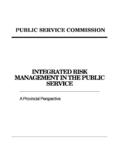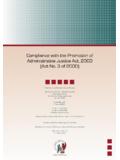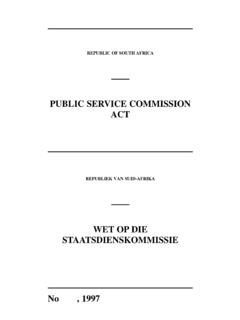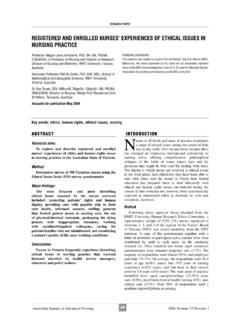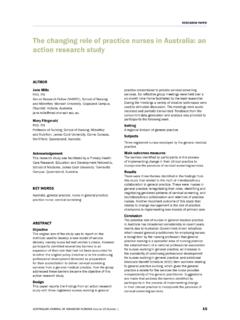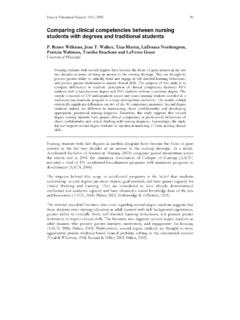Transcription of RWOPS: PSC REPORT
1 rwops : PSC REPORT FOREWORD In terms of the Constitution, 1996, the Public Service Commission (PSC) is mandated to promote and maintain a high standard of professional ethics throughout the Public Service. Section 196 of the Constitution of the Republic of South Africa, 1996 (Act No. 108 of 1996), also provides that the PSC is empowered to investigate cases of corruption ( non compliance with the Code of Conduct, etc.) of its own accord or on receipt of a complaint. Furthermore, the rules of the Public Service Commission for lodging complaints, as gazetted on 19 July 2002, stipulate the procedure in respect of which members of the public may lodge complaints regarding maladministration and corruption, the standard of service or improper dealings with regard to public money, behaviour, competency, diligence or attitude of staff, and any form of discrimination.
2 Combating corruption in the Public Service is, therefore, not only a challenge facing government, but also one of its priorities for promoting good governance and accountability. The Commission wishes to thank the MEC for Health in Gauteng Province for permitting the Office of the PSC to conduct this investigation into remunerative work outside the Public Service in the health sector within the province. Based on the findings in the REPORT , the PSC appeals to all employees to demonstrate a practical understanding of procedures, directives and instructions contained in the Code of Conduct for the Public Service. Such an understanding is not only possible, but mandatory, if effective service is to be rendered to our citizens.
3 This REPORT contains findings and recommendations on allegations of mismanagement in respect of remunerative work outside the Public Service. I thank the officials who assisted with this investigation by providing valuable information and advice, and I trust that the Departments of Health, both at the national and provincial levels, will derive value from the content of this REPORT . As always, I intend to engage with health authorities generally on the issues raised and to ascertain the level of implementation of recommendations made. PROF. SS SANGWENI CHAIRPERSON: PUBLIC SERVICE COMMISSION i rwops : PSC REPORT AN INVESTIGATION INTO REMUNERATIVE WORK UNDERTAKEN OUTSIDE THE PUBLIC SERVICE ( rwops ) BY NURSES, DOCTORS AND ALLIED HEALTH PROFESSIONALS TABLE OF CONTENTS Glossary iii summary Introduction Findings Recommendations Iv v-vi vii-viii 2.
4 Terms of reference for this study Introduction Project objectives Research methodology Mandate Terms of reference Consultations Obstacles encountered during the inquiry 1 2 2 3 4 4 4 3. International best practice Introduction General principles Conflict of interest issues Application for permission to engage in outside employment Changes in circumstances Utilisation of paid and unpaid leave Unpaid voluntarily work 5 5 5 6 6 7 7 4. Policy guidelines Remunerative work outside the Public Service 8-11 5. Good governance and leadership Introduction Organizational Values Leadership Style Decision Making 12 12 14 15 6.
5 Outside employment while working in the Public Service Introduction Authorisation Disciplinary Action Knowledge of the Public Service Regulations Reasons for Moonlighting by Nurses, Doctors and Allied Health Professionals Conditions of Service 16 17-18 19 19-21 21 - 29 29-30 7. Findings 31-32 8. Recommendations 33-34 9. Conclusion 35 APPENDICES 10. Patient s rights 11. Questionnaires 36-38 39-42 ii rwops : PSC REPORT iii GLOSSARY rwops Remunerative Work Outside the Public Service PSC Public Service Commission CEO Chief Executive Officer PSR Public Service Regulations SMS Senior Management Service HPCSA Health Professions Council of South Africa SANC South African Nursing Council ICU RN Intensive Care Unit Registered nurse ICU NA Intensive Care Unit Nursing Assistant SEN Senior Enrolled nurse NA Nursing Assistant EAN Enrolled Assistant nurse EN Enrolled nurse HASA Health Association of South Africa NASA Nursing Association of South Africa ICAC Independent Commission Against Corruption LIST OF TABLES Table 1.
6 Number of employees involved in moonlighting activities Table 2: Number of completed questionnaires Table 3: Number of disciplinary cases taken regarding rwops Table 4: Ethics compliance Table 5: Salaries and overtime for nurses Table 6: Salaries and overtime for doctors Table 7: Moonlighting rates: Lunghile Nursing Agency Table 8: Moonlighting rates: Private clinics Table 9: Signs and symptoms of burnout rwops : PSC REPORT iv INTRODUCTION EXECUTIVE SUMMARY INTRODUCTION Section 196 of the Constitution, 1996, provides that the PSC is empowered to investigate cases of corruption of its own accord or on receipt of a complaint. Furthermore, the rules of the Public Service Commission for lodging complaints, as gazetted on 19 July 2002, stipulate the procedure in respect of which members of the public may lodge complaints regarding maladministration and corruption, the standard of service rendered, dishonesty or improper dealings with regard to public money, the behaviour, competency, diligence or attitude of staff, and any form of discrimination.
7 The Commission is also required to promote and maintain a high standard of professional ethics in the Public Service. This REPORT deals with an investigation conducted by the Public Service Commission into the management of remunerative work outside the Public Service ( rwops ) by nursing personnel, doctors and allied health professionals in Gauteng Province (specifically the Johannesburg General and Pretoria Academic hospitals). The investigation was initiated owing to a complaint submitted by a group of nurses concerning non-compliance with the provisions of the Code of Conduct for the Public Service. In the complaint it was highlighted that - nurses, doctors and allied health professionals perform remunerative work outside the Public Service without prior approval from their management.
8 They abuse sick leave privileges for the purposes of undertaking rwops . Some doctors and nurses steal state assets under their jurisdiction or gain access to them by abusing their positions in government and utilizing such assets in their private practices outside the hospital. This issue, however, is not the subject of this investigation. Acquiring publicly-owned assets by way of illegal transactions and fraud constitutes the most extensive form of this type of corruption. The methodology followed for gathering data was to conduct interviews with nurses, doctors, allied health professionals, human resources management staff, chief executive officers, hospital health advisory committees, the Health Professions Council of South Africa, the South African Nursing Council and senior managers in the Gauteng Health Department.
9 rwops : PSC REPORT v FINDINGS Following the analysis of the findings, the overall picture that emerged is a highly negative and disturbing one. It clearly shows that the management of remunerative work outside the Public Service is not regularly monitored, that staff is generally negative about hospital management and that staff morale is low. The following problems were identified: It was found that more than 50% of specialist doctors own private clinics. There is a high rate of abusing official time, particularly, employees requesting sick leave with full pay in order to moonlight. Some nurses and doctors submit claims for overtime that they did not perform.
10 Deliberate and continuous absenteeism is perpetrated in order to engage in rwops . The problem is so severe that the majority of doctors work only for four hours on average before leaving to consult private patients in their private clinics. When their services are required at the hospital where they are employed, they may be found attending to their patients at the private clinics. A total of 1 312 nurses and 30 doctors in both hospitals applied for rwops during the period 2000-2001. Nurses employed in state hospitals are recruited by private agencies to perform rwops in other state hospitals during their vacation leave or sick leave (with full pay).


